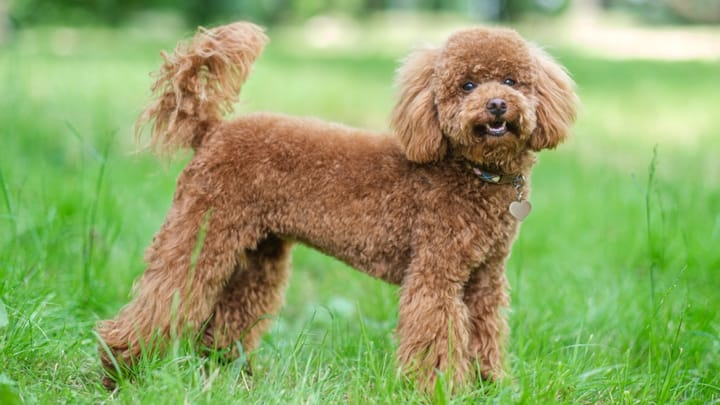Toy Poodle


The Toy Poodle, a variety of the Poodle, is a small, intelligent, and elegant dog, renowned for its hypoallergenic curly coat and lively personality. Originally bred in France and Germany, this affectionate breed excels in obedience and agility. Standing under 11 inches tall, the Toy Poodle makes a charming companion, ideal for families or individuals seeking a playful yet loyal pet with minimal shedding.
|
Life expectancy |
The Toy Poodle has a life expectancy of between 12 and 15 years |
|
Temperament |
|
|
Size |
Small
|
|
Adult size |
Female
Between 9 and 11 in
Male
Between 9 and 11 in
|
|
Adult weight |
Female
Between 4 and 9 lb
Male
Between 4 and 9 lb
|
|
Coat colour
|
Black White Brown |
|
Type of coat
|
Wavy |
|
Eye colour
|
Brown
|
The Toy Poodle is intelligent, affectionate, and hypoallergenic, making it an ideal pet for allergy sufferers. It adapts well to flats, needs regular grooming, and benefits from mental and physical stimulation. While generally healthy, it can be prone to breed-specific issues like ear infections and patellar luxation. Early socialisation and positive training ensure a happy, well-rounded companion.
More details about the Toy Poodle
Toy Poodle: Origins and history
The Toy Poodle’s ancestors, such as the Barbet, were originally used for hunting waterfowl, and dogs resembling the Poodle appear in records dating back to the Middle Ages. However, it wasn’t until the 17th century that the breed began to emerge as distinct. Developed during the reign of Louis XV, the Toy Poodle gained popularity with the French bourgeoisie, who appreciated its smaller size as a companion animal. The breed's history is rooted in Germany, with influences from Portuguese, Hungarian, and Spanish Water Dogs. Over time, breeders selected smaller Poodles, giving rise to the Toy Poodle as we know it today, intelligent, affectionate, and ideal for companionship.
Initially used for hunting, Poodles became symbols of refinement, adored by nobility and often featured in circuses. Today, the Toy Poodle remains a beloved breed, cherished for its sociable temperament and suitability as a companion, particularly for families and apartment dwellers.
FCI classification of the Toy Poodle
-
Group 9 - Companion and Toy Dogs
-
Section 2 : Poodle
Toy Poodle: Characteristics
Toy Poodle: Behaviour
Training a Toy Poodle
Training a Toy Poodle is relatively straightforward due to its intelligence and eagerness to please. Use positive reinforcement methods, such as treats and praise, to encourage good behaviour.
Keep sessions short, engaging, and consistent. Start with basic commands like sit, stay, and recall, gradually introducing new skills. Early socialisation helps build confidence and reduces shyness.
Toy Poodle: Lifestyle
Breed compatibility Toy Poodle
Toy Poodle: Purchase price
The purchase price of a Toy Poodle in the UK typically ranges from £1,500 to £3,000, depending on the pedigree, breeder reputation, and location.
There are also daily costs, including food, treats, vet care and grooming. Additionally, insurance and other one-off costs like toys or training may add to the overall expense.
Toy Poodle: Shedding
Light
The Toy Poodle is popular for its low-shedding, hypoallergenic coat, making it an ideal choice for allergy sufferers or those seeking a dog with minimal shedding. Unlike many breeds, the Toy Poodle’s curly coat traps loose hair rather than releasing it into the environment, reducing the need for constant cleaning around the home.
Toy Poodle: Grooming
Although the Toy Poodle sheds very little, regular grooming is essential to maintain its coat's health and prevent tangles. Weekly brushing removes dead hair and keeps the curls in good condition. Bathing every 3 to 6 weeks, depending on activity levels, helps keep the coat clean and fresh. Professional grooming every six to eight weeks is recommended to maintain the coat’s texture and shape.
Toy Poodle: Health
Although the Toy Poodle is generally healthy and has a robust constitution, it is still susceptible to certain breed-specific health conditions. While not as hardy as larger breeds, it is more resilient than many other small breeds.
The Toy Poodle can tolerate moderate temperatures but is sensitive to excessive heat. It should be protected from very high temperatures to prevent heat stress.
Although it can endure cold weather to some extent, the Toy Poodle is not suited to living outdoors in extreme winter conditions. Proper protection, such as a warm coat, is necessary in very cold climates.
The Toy Poodle may be prone to weight gain if not adequately exercised or properly fed. Careful attention to its diet and activity levels is essential to prevent obesity.
This breed can be prone to certain health issues, including ear infections (due to its long ears), patellar luxation, epilepsy, and progressive retinal atrophy. While not overly predisposed to illness, it does have some specific vulnerabilities that owners should monitor.




